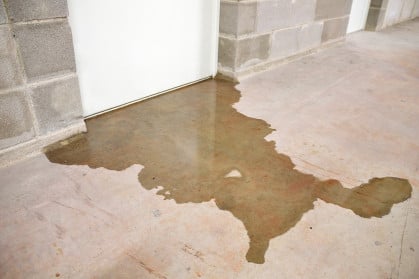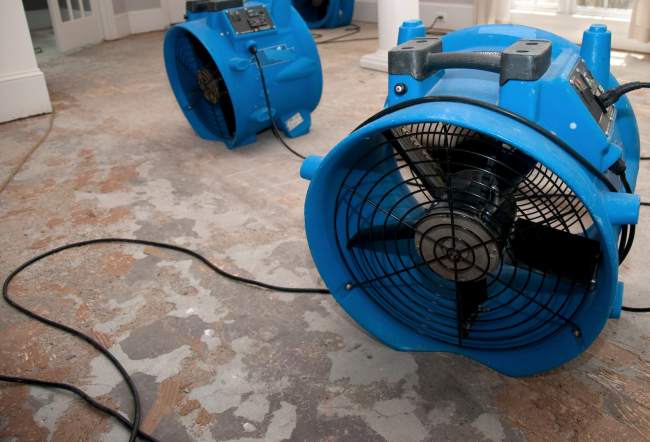Our apartment building is leaking. What are our responsibilities as a board?
- Co-op and condo boards have legal obligations regarding water damage
- Your board should take advantage of building insurance to cover repairs
- Delaying repairs can be very costly to a condo or co-op board

The purpose of insurance is to receive an indemnity for covered losses, rather than pay for liabilities out of pocket, so your board should be taking advantage of that coverage.
iStock
If you are seeing water damage inside your building, you need to immediately establish where the leak is coming from.
“Regardless of whether it is a co-op or a condo, the board is fully responsible for any water penetration coming in from the façade or roof and your building’s priority is to make the necessary repairs,” says New York City real estate attorney Steven Wagner, a partner at Adam Leitman Bailey, P.C. who represents tenants and apartment owners, as well as co-op and condo boards.
The frequency and intensity of weather events that NYC experiences are expected to increase, making it even more critical, as a priority for their residents, for boards to address flood risk and issues related to water damage.
Your first step will be to hire an architect to figure out the cause of the leak, and establish whether it is due to a leaking façade, a construction defect, faulty pipes, bad drains, or if the roof needs to be replaced. Then you need to get bids on the work and employ a project engineer who can oversee the repairs. Next you’ll establish whether you have insurance coverage.
“Irrespective of the cause—even if the shareholder or owner is to blame—it doesn’t absolve the board from the responsibility to make repairs to the common areas and in some cases, the units,” Wagner says.
Who is responsible for water damage in a co-op or condo?
In a co-op, the warranty of habitability mandates that the landlord is responsible for keeping the shareholders' apartments and the building safe and livable at all times. The way co-ops are structured means boards take on a landlord’s responsibility in the eyes of the law. So a co-op board has the same apartment repair obligations to shareholders as regular landlords have to ordinary, non-investing tenants.
“The buck stops with the board,” Wagner says. “When repairs are delayed, the costs can increase exponentially.”
In a condo building, there is no leasehold relationship between the board and the owners, so the warranty of habitability does not apply. However, if there’s flood damage in a condo, the board will want to be involved to establish where the water is coming from.
“The bylaws will usually outline that the apartment owner is responsible for interior repairs to the apartment but there is usually a contractual provision for a negligence claim if the cause of the water damage originates from the common elements,” Wagner says.
In a situation where a board had knowledge about a common element defect or damage leading to water getting into apartments, the condo association could be collectively responsible for making interior apartment repairs.
“If two years later a problem emerges either with catastrophic flood or water damage over time, the board’s knowledge of those preexisting conditions could create a claim against the condo for negligence,” Wagner says.
How does the board make a successful damage claim?
Once you’ve established the cause of the problem, you will need to figure out the cost of the repairs. Boards typically pay between $50,000 and $100,000 annually in premiums for an insurance policy with coverage up to tens or hundreds of millions of dollars. The purpose of insurance is to receive an indemnity for covered losses, rather than pay for liabilities out of pocket, so your board should be taking advantage of that coverage.
You will also want to see if the affected shareholders have homeowner’s insurance. “That doesn’t shift responsibility—it just might provide an opportunity to get additional money to cover the costs,” Wagner says.
When making a claim, boards should challenge the estimates given by the insurance company as well as, in some cases, the analysis of who is responsible. “Time and time again, insurance companies improperly minimize or underestimate the board’s repair responsibilities under the bylaws or proprietary lease—the board’s obligations to repair are primary and substantial,” Wagner says.
He points out that failure to maintain a property is not something a board is insured against.
In a co-op, the insurance company will often claim the board doesn't have to repair an apartment interior that is not original to the building.
“We’ve seen cases of apartments going unrepaired for years even after the board has received notice of uninhabitable water damage but the cost of delaying repairs only increases the cost of those repairs and the shareholder’s damages,” Wagner says.
The cost of delaying repairs can be extremely expensive
When a board delays repairs and flood remediation, Wagner says the numbers can get totally disproportionate and out of control.
“It often comes down to a disagreement over a portion of the repair costs. In addition, co-ops have historically underestimated their repair obligations with these kinds of claims saying the shareholder is responsible for all interior repairs, but that is false,” he says.
Wagner has seen situations where a $50,000 repair ends up being a multi-million dollar lawsuit. He points out that in a co-op, the board can be exposed to a claim from the shareholder for legal fees due to a breach of the proprietary lease. A shareholder may also be eligible for a maintenance abatement which can be a substantial sum. “Then there is the issue of where the shareholder lives while repairs to the apartment are carried out,” Wagner says.
Insurance companies have reduced additional living expense benefits for owners who are displaced due to apartment damage. That coverage is often now capped at 40 percent of personal property contents so a $100,000 coverage would give a maximum of $40,000.
“That doesn’t go very far if you are a family and you have to move to a hotel in New York City,” he says. If the board doesn’t act promptly, they could find themselves picking up the bill.
Preventative measures can help you avoid water damage
To avoid litigation over water damage, your board needs to be willing and financially prepared to make structural repairs to the building without kicking the can down the road, Wagner says. Roof replacements are a good example of capital investments that make a board less vulnerable to water damage disputes.
If a managing agent or engineer points out you have a couple more years before the roof needs upgrading, a board should be proactive about getting the work done.
“The notion of delaying repairs is very dangerous and could mean a board is liable if a winter freeze and thaw results in leaks that could have been prevented with timely capital investment,” Wagner says.
New York City real estate attorney Steven Wagner, a partner at Adam Leitman Bailey P.C., has more than 30 years of experience representing co-ops, and condos, as well as individual owners and shareholders. You can submit a question for this column via email or if you’d like to arrange a free 15-minute telephone consultation with Steve, send an email or call (212) 584-1973.
You Might Also Like
Sign Up for our Boards & Buildings Newsletter (Coming Soon!)
Thank you for your interest in our newsletter. You have been successfully added to our mailing list and will receive it when it becomes available.






















